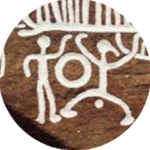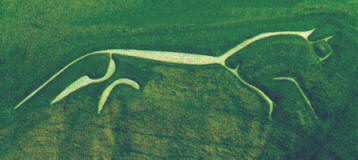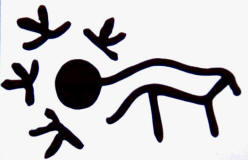THE SATURN
MYTH RE-RECONSTRUCTED
- A critical analyzing review on the planetary Saturn
Myth.
Quotations from,
and remarks to, David Talbott`s book: The Saturn Myth,
Saturn Myth
Reconstructed, pages 35-36
From the foregoing
evidence (Pages 1-34) a distinctive portrait of Saturn emerges. In
the earliest age recalled by the ancients the planet— or
proto-planet—came forth from the cosmic sea to establish dominion
over the primeval Cosmos. (#1) The planet-god ruled as
the solitary, central light, worshiped as the god One—the only god
in the beginning. (#2)
Saturn's epoch left a
memory of such impact that later generations esteemed the god as
the Universal Monarch, the first and ideal king, during whose
rule occurred the prehistoric leap, from barbarianism to
civilization. (#3) Throughout Saturn's era of cosmic
harmony no seasonal vicissitudes threatened men with hunger or
starvation, and men suffered neither labor nor war. (#4)
In the "creation"
Saturn, the primal Seed, (#5) ejected the fiery material
("primeval matter"), which congealed into a circle of lesser lights
(the Cosmos). The myths describe this resounding birth of the
secondary gods as Saturn's "speech: Saturn was the Word or voice of
heaven". (#6)
The ancients conceived
Saturn as the visible intelligence bringing forth the Cosmos as
his own body "(#7) and regulating its
revolutions. Thus was the planet denominated the Heaven Man—a
being eventually recalled as the prototype of the human race—the
first ancestor. "(#8)
When Saturn departed the
world, the Golden Age catastrophically ended. This is the
universal tale of the dying god, the overthrown "first king" or
fallen "first man." "(#9)
Whether betrayed by a dark
force, or chastised for having committed the forbidden sin, or
inflicted with old age and a weariness of mankind,
"(#10) the result is the same: a corruption of
nature and a progressive worsening of the human condition. The story
is the first—and one could almost say, only—theme of tragedy
and drama in antiquity: Saturn's Golden Age came to a sudden and
catastrophic end, either caused by or accompanied by the fall of the
great god.
That the distant planet
Saturn should loom at the center of ancient rites is a fact which
conventional wisdom will not easily explain."(#11) One looks in vain for any characteristic of Saturn, the
present-day planet, which might account for Saturn, the
primeval god. "(#12) Could the present speck of light
have provoked the ancient memory of a creator standing alone in the
deep? Or produced the universal legend of the first king and the
lost age of abundance? Or inspired the myth of the Heaven Man?
"(#13)
If, as is almost
universally believed, the heavens have undergone no major changes
in astronomically recent times, then the myth—however
meticulously developed—can only be a fabrication, produced through
the purest disregard for actual observation and experience. (#14)
I do not ask the reader to ignore this possibility, and I
am fully aware that to many mythologists myth and fancy are
synonymous. Since the argument of this book rests on the coherence
of the Saturn myth as a whole, and since many details remain to
be covered (#15) I urge only a willingness to consider
the evidence in its entirety. Whatever the true origins of the
myth, it constituted for the ancients a compelling vision—a vision
deserving careful study by all students of history, religion, and
mythology. (#16)
Quote unquote.
# My Comments
1)
How can planet
Saturn “come forth from the cosmic sea and establish dominion over
the primeval Cosmos”? Was planet Saturn mythological created as the
first of all? What are the logics of such a mythological statement?
2)
How can a planet be
“the only god in the beginning”?
3)
From which
mythological supreme being did humans learn of civilization? The
Planet Saturn?
4)
From which major
fertility deities was all life created? The inferior planet Saturn?
5)
The planet Saturn
as “the primal Seed”? Did the planet Saturn create everything in our
Solar system and in our Milky Way galaxy?
6)
Which deity “first
voice” was the first to set of the creation? The inferior planet
Saturn?
7)
What intelligence
can the planet Saturn provide? Does planet Saturn have the shape of
a body “to bring forth”?
8)
How can planet
Saturn possibly be a “prototype of the human race” and “the first
ancestor”?
9)
How can planet
Saturn be a Universal tale of the overthrown first king or fallen
first man? Was there nothing before planet Saturn was created?
10) How can planet
Saturn “commit a forbidden sin”?
11) How
can a planet Saturn “loom at the center of ancient rites”
devaluating the Sun and other major heavenly bodies?
12) How can an
inferior planet be a “primeval god”? Did the planet Saturn create
everything before anything else?
13) How can planet
Saturn mythological possibly be described as a “heaven man”?
14) Maybe it is
possible that a “purest disregard for actual observation and
experience” in the construction of The Saturn Myth not have regarded
the real mythological and astronomical human experiences?
15) Yes
indeed, many obvious mythological details remain to be
covered – and to be reinterpreted.
16) Yes, the true
origins of the myths constituted a compelling vision for the
ancients. Unfortunately, not many scholars have the mythological
insight, fantasy, spiritual or visionary capabilities to grasp even
the most obvious details and their real mythological and
cosmological meaning.
17) Regarding the
mythological heritage, it is not enough to have the brilliant
intellectual capacity – one also has to have the genuine spiritual
capacity of our ancestors.
My Conclusion
- Reading The Saturn Myth
book, I fully understand that David Talbott throughout the entire
book frequently inserts quotation marks when describing the many
deities and their qualities. I would certainly have done the very
same in order not to compromise my consciousness doubts – high or
low – but still trying to make my case.
- I fully respect the
brilliant intellectual powers of David Talbot! He have done a
tremendous work, assembling a huge amount of myths – but I reject
the Velikovski and Dave Talbott´s mythical conclusions regarding the
planet Saturn – and the planet Venus.
Both the rather inferior
planets of Saturn and Venus are almost fatally confused with the
major and superior deities of the Milky Way from which all myths of
creation origin.
What has the larger
importance: The Saturn planet? The Venus planet? The Sun? Or the
Milky Way Galaxy?
How come a planet can have bigger
mythological importance than the Sun or the Milky Way? The answer is: They can't!
The Velikovski Saturn and Venus
Myth is as totally mythological misconception, confusing the
superior deities of the Milky Way for the inferior planetary deities
of Saturn and Venus.
Explaining link:
http://www.native-science.net/Forefather.Worship.htm
John
O`Neill, author of "The night of the Gods"
http://www.archive.org/stream/nightgods00unkngoog#page/n6/mode/1up
Cosmic,
Cosmogonic Myths and Symbols - Which all describes and confirms my
texts.
Look here
for some more specific explanations of Milky Way Deities and other
Ancient Symbols connected to the Milky Way Mythology
Relevant Wikipedia Links:
Quote from Wikipedia:
"Saturn
(Latin:
Saturnus)
was a major
Roman
god
of agriculture and harvest. In medieval times he was known as the
Roman god of agriculture, justice and strength; he held a sickle in
his left hand and a bundle of wheat in his right. His mother's name
was Helen, or Hel. He was identified in
classical antiquity
with the
Greek deity
Cronus,
and the mythologies of the two gods are commonly mixed.
The
Wikipedia text about
Cronus is also
wrong/mixed up itself, claiming that:
Cronus
not should be confused to
Chronos
- but studying their qualities and
attributes, they are identical!
Saturn
http://en.wikipedia.org/wiki/Saturn_(mythology)
Saturn (Latin:
Saturnus) was a major
Roman
god of agriculture
and harvest. In medieval times he was known as the Roman god of
agriculture, justice and strength; he held a sickle in his left hand
and a bundle of wheat in his right. His mother's name was Helen, or
Hel. He was identified in
classical antiquity
with the
Greek deity
Cronus, and the
mythologies of the two gods are commonly mixed.
Saturn's wife was
Ops,
Rhea's equivalent –
not
Magna Mater. Saturn
was the father of
Ceres,
Jupiter, and
Veritas, among
others. Saturn had a temple on the
Forum Romanum which
contained the Royal Treasury. Saturn is the namesake of
Saturday (dies
Saturni), the only day of the week to retain its Roman name in
English.
Mythology of Saturn
In Babylon he was called Ninib and was an
agricultural deity. Saturn, called Cronus by the Greeks, was, at the
dawn of the Ages of the Gods, the Protector and Sower of the Seed
and his wife, Rhea, (called Ops by the Romans) was a Harvest Helper.
Cronus was one of the Seven Titans or Numina and with them, reigned
supreme in the Universe. The Titans were of incredible size and
strength and held power for untold ages, until they were deposed by
Zeus.
The first inhabitants of the world were the
children of Gaia (Mother Earth) and Ouranos (Father Sky). These
creatures were very large and manlike, but without human qualities.
They were the qualities of Earthquake, Hurricane and Volcano living
in a world where there was yet no life. There were only the
irresistible forces of nature creating mountains and seas. They were
unlike any life form known to man.
Three of these creatures were monstrously huge
with one hundred hands and fifty heads. Three others were
individually called Cyclops, because each had only one enormous eye
in the middle of their foreheads. Then, there were the Titans, seven
of them, formidably large and none of whom were purely destructive.
One was actually credited with saving man after creation.
Ouranos hated the children with the fifty heads.
As each was born he placed it under the earth. Gaia was enraged by
the treatment of her children by their father and begged the
Cyclopes and the Titans to help her put an end to the cruel
treatment. Only the Titan, Cronus, responded. Cronus lay in wait for
his father and castrated him with his sickle. From Ouranos's blood
sprang the Giants, a fourth race of monsters, and the Erinyes (the
Furies), whose purpose was to punish sinners. They were referred to
as "those who walk in darkness" and were believed to have writhing
snakes for hair and eyes that cried blood. Though eventually all the
monsters were driven from Earth, the Erinyes are to remain until the
world is free of sin.
With the deposing of his father, Cronus (Saturn)
became the ruler of the Universe for untold ages and he reigned with
his sister, Rhea (Ops), who also became his wife.
It was prophesied that one day Cronus would lose
power when one of his children would depose him. To prevent this
from happening, each time Rhea delivered a child Cronus would
immediately swallow it. When her sixth child, Zeus, was born, Rhea
had him spirited away to the island of Crete. She then wrapped a
stone in his swaddling clothes. Her deception was complete when
Cronus swallowed it, thinking it was the child. When Zeus was grown,
he secured the job of cup-bearer to his father. With the help of
Gaia, his grandmother, Zeus fed his father a potion that caused him
to vomit up Zeus's five siblings, Hestia, Demeter, Hera, Hades, and
Poseidon.
A devastating war that nearly destroyed the
Universe ensued between Cronus and his five brothers and Zeus and
his five brothers and sisters. Zeus persuaded the fifty headed
monsters to fight with him which enabled him to make use of their
weapons of thunder, lightning and earthquake. He also convinced the
Titan, Prometheus, who was incredibly wise, to join his side. With
his forces, Zeus was victorious and the Olympians reigned supreme.
Cronus and his brothers were imprisoned in the Tartarus, a dark,
gloomy region at the end of the Earth.
In Roman mythology when Jupiter (Zeus) ascended
the throne, Saturn (Cronus) fled to Rome and established the Golden
Age, a time of perfect peace and harmony, which lasted as long as he
reigned. In memory of the Golden Age, the Feast of Saturnalia was
held every year in the winter at the Winter Solstice. During this
time no war could be declared, slaves and masters ate at the same
table, executions were postponed, and it was a season for giving
gifts. This was a time of total abandon and merry making. It
refreshed the idea of equality, of a time when all men were on the
same level. Christians adopted the feast and renamed it Christmas.
When the festival ended, the tax collectors appeared and all money
owed out to government, landlords, or debtors had to be accounted
for.
This is another side to Saturn and it's ruling
sign, Capricorn: the settling of accounts. The time of the winter
solstice is when the Sun enters the sign Capricorn.
Hesiod wrote of the five ages of mankind: Gold,
Silver, two ages of Bronze and an age of Iron. The Age of Gold was
the purest age, when no labor was required and weather was always
pleasant. It was virtually a place of pleasant surroundings and of
abundance. Death was not an unpleasant eventuality and people
occupied their time in pleasant pursuits.
Cronus ruled over
this Golden Age.
Chronos
http://en.wikipedia.org/wiki/Chronos
In
Greek mythology,
Chronos
(Ancient
Greek:
Χρόνος)
in pre-Socratic philosophical works is said to be the
personification of
time.
His name actually means "time," and is alternatively spelled
Khronos
(transliteration of the Greek) or Chronus
(Latin version). Not to be confused with
Cronus,
a
Titan.
Chronos was imagined as an incorporeal god, serpentine in form, with
three heads—that of a man, a bull, and a lion. He and his consort,
serpentine
Ananke
(Inevitability), circled the primal world-egg in their coils and
split it apart to form the ordered universe of earth, sea and sky.
He was depicted in Greco-Roman mosaics as a man turning the
Zodiac Wheel.
Often the figure is named
Aeon
(Eternal Time), a common alternate name for the god.
Chronos is usually portrayed through an old, wise man with a long,
gray beard, such as "Father
Time."
Some of the current English words whose etymological root is
khronos/chronos include
chronology,
chronic,
and
chronicle.
Ananke mythology
http://en.wikipedia.org/wiki/Ananke_(mythology)
Ananke (mythology)
in Greek mythology.
She marks the beginning
of the cosmos, along with
Chronos.
The mother of the
Moirae and Adrasteia,
Goddess of destiny,
necessity, and fate.
In
Greek mythology,
Ananke (Ancient
Greek: Ανάγκη)
was the personification of
destiny, necessity
and
fate, depicted as
holding a
spindle. She marks
the beginning of the cosmos, along with
Chronos. She was
seen as the most powerful dictator of all fate and circumstance
which meant that the other Gods had to give her respect and pay
homage as well as the mortals.
The
following is a reply on a article in which the Milky Way myths are
not understood and somewhat rediculed.
"Suspending
Disbelief" -
http://www.thunderbolts.info/wp/2012/04/05/suspending-disbelief/
A
sky-high column of glowing plasma has influenced countless religious
ideas.
By
Comparative Mythologist Rens van der Sluijs
Apr
06, 2012



































